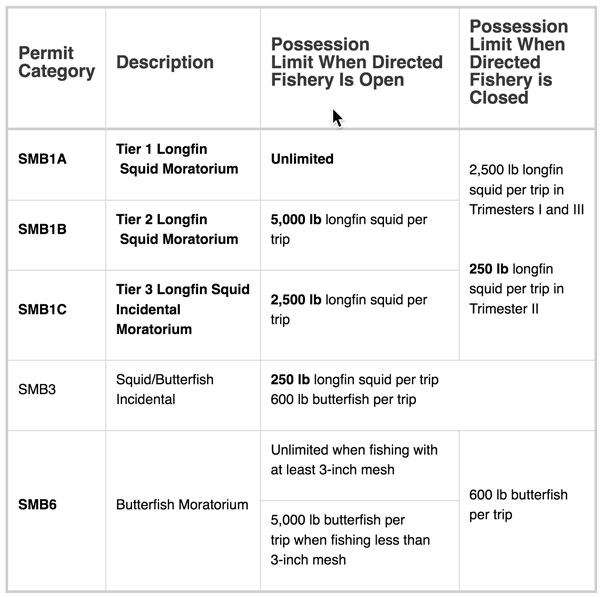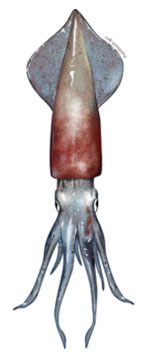Tier 3 Longfin Squid Incidental Catch Permit Changes
NMFS has approved Amendment 20 to the Atlantic Mackerel, Squid, and Butterfish Fishery Management Plan. This action revises the current longfin squid/butterfish moratorium permit and longfin squid possession limits to preserve fishing opportunities for more recently active participants in the fishery and avoid overharvesting the Trimester II longfin squid quota. This bulletin provides a summary of approved measures. More detailed information can be found in the Amendment 20 final rule and on our Atlantic mackerel, squid, and butterfish web page.

Changes to Longfin Squid and Butterfish Permits
Amendment 20 separates the current longfin squid/butterfish moratorium permit (SMB1) into two separate permits and creates a tiered permit system for longfin squid moratorium permits based on recent landings history. A vessel issued an open access squid/butterfish incidental catch permit (SMB3) may qualify for a new Tier 3 longfin squid incidental moratorium permit (SMB1C) if they meet the qualification criteria described below.
New longfin squid and butterfish moratorium permits become effective on March 1, 2019. The Regional Administrator will issue new permits to qualified vessels in late February 2019 as part of the annual permit renewal process, or once the application is reviewed. Updated permits will then be reissued for the start of the new fishing year on May 1, 2019. Amendment 20 changes to longfin squid moratorium permits and possession limits are in bold in the table above.
Longfin Squid Moratorium Tier 3 Permit (SMB1C) Qualification Criteria
To qualify for a SMB1C longfin squid permit, a vessel must have been issued an open access SMB3 permit and landed at least 5,000 lb of longfin squid in any year during 1997-2013. The Regional Administrator will use available dealer landings data to determine whether a vessel qualifies to be issued a SMB1C permit.
Application and Appeals Process

You may apply for a SMB1C longfin squid permit by filling out the enclosed application. To be eligible for a SMB1C permit, you must submit an application before February 29, 2020.
If you apply for a SMB1C permit, but are denied by the Regional Administrator, the denial letter will provide detailed instructions about how to appeal that denial. The appeal must be in writing and mailed to the Regional Administrator within 30 days of the denial notice. It should include the reason for the appeal and evidence to support your claim. Evidence could include additional landings records, affidavits by dealers, vessel replacement or ownership change paperwork, and other evidence documenting that your vessel landed at least 5,000 lb of longfin squid in any year during 1997-2013.
During your appeal, you may request the Regional Administrator issue you a letter of authorization (LOA) to fish under the SMB1C longfin squid possession limit instead of those for the open access SMB3 permit. An LOA is required to allow your vessel to land up to 2,500 lb longfin squid per trip while your appeal is under review, unless possession for all vessels is reduced to 250 lb per trip when the Trimester II quota is caught.
Each appeal will be reviewed by the National Appeals Office. The Regional Administrator will make the final decision on each appeal based on the decision of the National Appeals Office. If your appeal is denied, your LOA will be cancelled, and you will be limited to possessing up to 250 lb of longfin squid per trip, consistent with the SMB3 permit possession limit.
